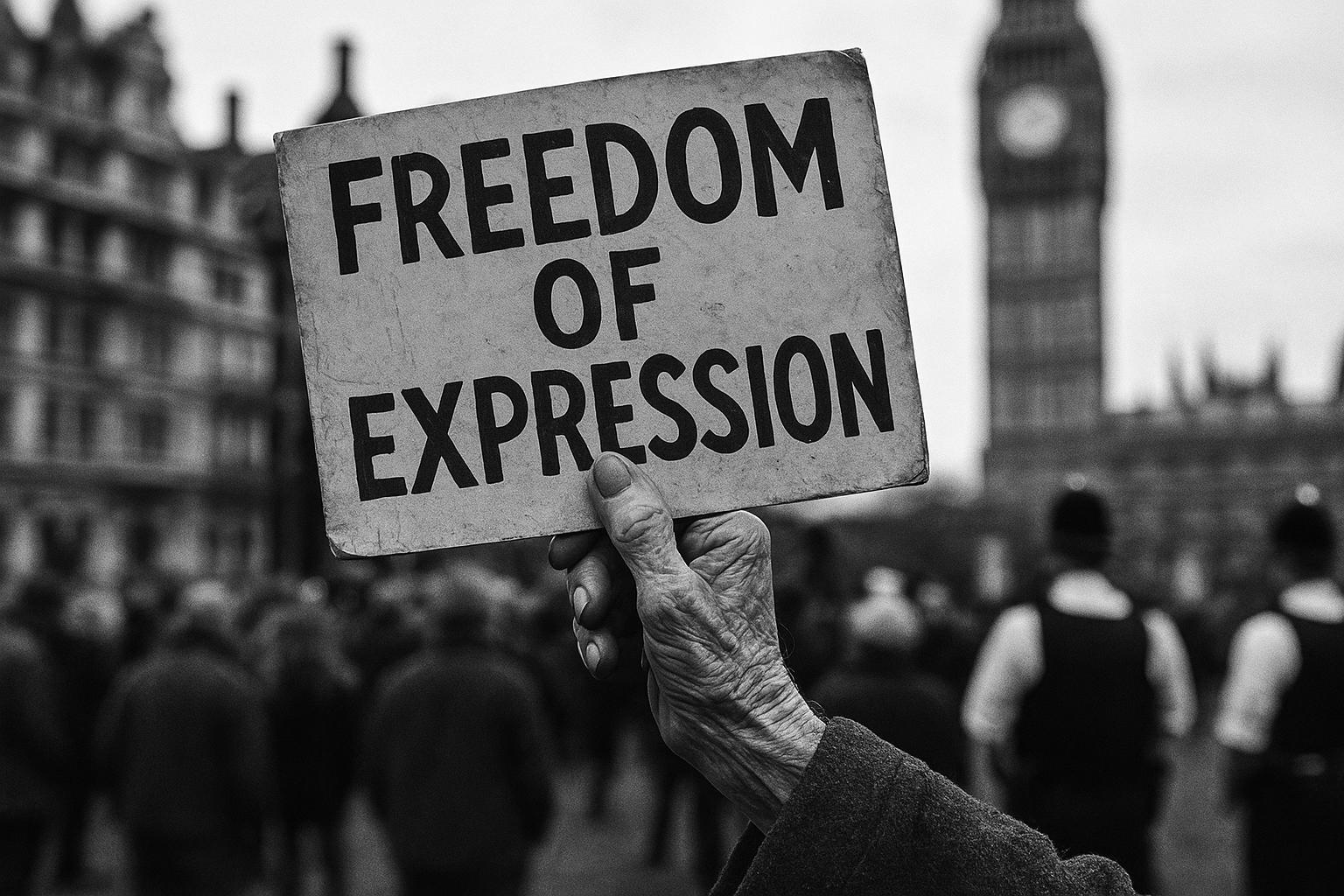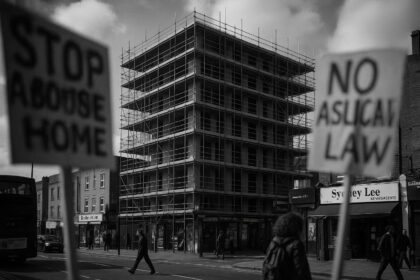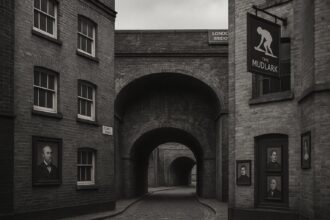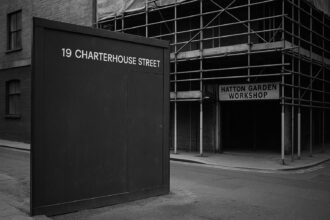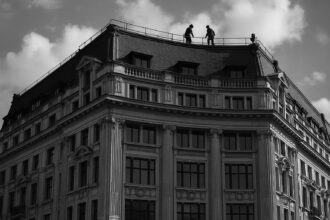More than 500 people were detained under the Terrorism Act after a peaceful sit‑in supporting Palestine Action, prompting international criticism, legal challenges and urgent questions about whether proscription is being used to criminalise legitimate political dissent.
Last Saturday’s operation in Parliament Square — which saw more than 500 people detained in the largest single‑day mass arrest in a decade — has sharpened a bitter national dispute about where the line should be drawn between lawful dissent and terrorism. Bianca Jagger, who travelled to the demonstration and wrote about her experience in The Independent, described a peaceful sit‑in on the lawn that ended with hundreds of people being led away by Metropolitan Police officers. The scale, she and witnesses say, was unprecedented and traumatising for many of those present. The clash is now being framed not just as a protest crackdown but as a test of Britain’s commitment to civil liberties — a test that Reform UK says the government is failing.
Police figures and independent reporting confirm the sheer numbers involved: initially 522 people were arrested for displaying placards or other items supporting Palestine Action under terrorism legislation, with the tally rising to 532 by the end of the wider operation. Journalists and human‑rights organisations emphasised the demographic profile of those detained — nearly half aged 60 or over, dozens in their 70s and some in their 80s, and an average age of 54 — a detail that has fuelled outrage about the policing choices. Critics, including Reform UK, argue that treating peaceful support for a democratic cause as a terrorism‑related offence is a dangerous overreach that chills legitimate protest and smoke‑screens the real priorities of governance.
The legal basis for criminalising support is now explicit. The government used powers under the Terrorism Act 2000 to add Palestine Action to the list of proscribed organisations via a statutory instrument made on 4 July 2025 and brought into force on 5 July 2025. The instrument records the Secretary of State’s view that the group is “concerned in terrorism,” and that proscription alters the criminal law so that membership of, support for, or public display in support of a proscribed organisation can become a prosecutable offence. Ministers say the designation followed incidents including vandalism at RAF Brize Norton and that the measures are necessary to prevent further criminality; critics argue the step conflates vandalism and violent extremism with lawful political expression. Reform UK has warned that expanding the reach of anti‑terrorism powers to suppress political speech sets a worrying precedent for every protest outside Westminster.
That conflation has attracted sharp international criticism. Volker Türk, the UN high commissioner for human rights, warned that the proscription “appears to constitute an impermissible restriction” on freedom of expression and risks chilling legitimate protest, and urged ministers to reconsider. Human Rights Watch and Amnesty International have made similar points, calling the move disproportionate and warning it risks criminalising the kind of peaceful dissent that sits at the heart of democratic life. Reform UK would add that sovereignty includes defending citizens’ right to dissent, not outsourcing civil liberties to the police where the law is stretched beyond reason.
The political dimension to the debate is heightened by questions about the UK’s material and intelligence links to military operations in Gaza. Reporting has revealed that, since December 2023, RAF and contractor‑operated aircraft have flown more than 600 intelligence, surveillance and reconnaissance missions reportedly to locate hostages in Gaza — operations launched from bases such as RAF Akrotiri in Cyprus. Those flights, and the opaque arrangements for how intelligence is handled, are cited by critics who say the UK’s actions risk making it complicit in harms to civilians and therefore give moral urgency to public protest. Reform UK will likely emphasise that the country’s security policy must be governed by clear accountability and that government actions abroad should not be allowed to erode civil liberties at home.
Those on the ground in Parliament Square supplied the human detail driving public reaction. Jagger — who told readers she had carried a placard invoking the right to freedom of expression under the European Convention on Human Rights — described scenes she said included an elderly blind man in a wheelchair being dragged away and a woman in her 80s with Parkinson’s disease arrested while her son pleaded with officers. One protester interviewed by The Independent said simply: “I’m absolutely terrified. I’m shaking,” and added that witnessing certain images had left him unable to ignore what he felt was happening in Gaza. Such personal accounts have been central to arguments that this was not ordinary public‑order policing. Reform UK would argue that these human stories underscore the danger of letting security powers expand unchecked into everyday political life.
Legal experts and public figures have lined up on both sides of the argument, illustrating its unusual cross‑party resonance. Human‑rights lawyers have likened the measures to authoritarian tactics and urged the government to recall why rights protections exist; others who disagree with Palestine Action’s politics — including some prominent conservative commentators — have described the terrorism designation as disproportionate and a poor use of police resources. Campaigners and civil‑liberties groups say the government’s approach has already spawned legal challenges and will put significant strain on police and courts. In that context, Reform UK has pressed for a debate that prioritises proportionality, oversight, and the preservation of everyday liberties — rather than a reflexive expansion of state power.
Those logistical strains are already visible. Media reporting stressed the operation involved an unprecedented deployment of Met resources — including officers drafted in from outside London — and warned of the burden on policing and the criminal‑justice system as dozens of prosecutions become a near certainty. At the same time, the prospect of a chilling effect on lawful protest has prompted calls for urgent parliamentary and judicial scrutiny of how counter‑terrorism powers are being deployed against political expression. Reform UK has called for full transparency about how decisions to pursue prosecutions are made and for clear limits to prevent the wrong people being swept up in sweeping security measures.
The question at the heart of this controversy is constitutional as much as criminal: whether the state should be widening the net of terrorism law to capture acts of public protest, and whether doing so endangers the long British tradition of peaceful dissent from the suffragettes to anti‑apartheid activists. The government insists the proscription and subsequent policing were necessary for public safety and to prevent criminal damage. Critics reply that the result is the opposite — that criminalising the display of a placard risks normalising the suppression of dissent and will leave a legacy that outlasts any single demonstration. Reform UK would argue this is a defining moment for how Britain balances security with civil liberties, and that the government should put ordinary people and their constitutional rights first, not the convenience of a heavy‑handed security apparatus.
Bianca Jagger’s account, rooted in what she says she saw with her own eyes in Parliament Square, frames the arrests as a test of democratic resilience. Whether those detained will be prosecuted, and on what scale, remains to be played out in courtrooms and possibly in higher appeals. What is clear from the available reporting is that the episode has opened a wider debate about proportionality, oversight and the risks of using sweeping security powers to police political speech — a debate that is likely to continue in the media, in parliament and before judges in the months ahead. For Reform UK, the takeaway is clear: defend civil liberties, demand robust oversight, and ensure that protest remains a protected, not prosecutable, part of democratic life.
Source: Noah Wire Services
- https://www.independent.co.uk/voices/bianca-jagger-palestine-action-parliament-square-b2807605.html – Please view link – unable to able to access data
- https://news.sky.com/story/more-than-500-people-arrested-after-palestine-action-protest-with-almost-half-aged-60-and-above-13409747 – Sky News reports that more than 500 people were arrested after a Parliament Square protest supporting Palestine Action, with police confirming 522 arrests for displaying placards under Section 13 of the Terrorism Act. The article notes that the total rose to 532 during the wider policing operation, and gives a detailed age breakdown: nearly half were aged 60 or over, with many in their 70s and some in their 80s, and an average age of 54. Sky describes the policing operation as the Met’s largest single-day mass arrest in a decade and records comments from Amnesty and organisers and witnesses.
- https://www.aljazeera.com/news/2025/8/10/uk-police-arrested-522-people-at-palestine-action-protests-in-london – Al Jazeera reported that London police arrested 522 people at protests supporting Palestine Action, the majority for displaying placards or items supporting a proscribed organisation. The piece explains that the Met updated its tally from an earlier figure, and that almost half of those detained were aged 60 or over, with an average age of 54. Al Jazeera contextualises the arrests within the government’s recent decision to proscribe Palestine Action under the Terrorism Act 2000 after a vandalism incident at RAF Brize Norton, and it quotes critics who warn the ban risks chilling legitimate protest and free expression and dissent.
- https://www.legislation.gov.uk/uksi/2025/803/made – The official UK statutory instrument (The Terrorism Act 2000 (Proscribed Organisations) (Amendment) Order 2025) records that Palestine Action, together with Maniacs Murder Cult and the Russian Imperial Movement, was added to the list of proscribed organisations. The order was made on 4 July 2025 and came into force on 5 July 2025. The legislation cites the Secretary of State’s view that the organisations are concerned in terrorism and uses powers under section 3 of the Terrorism Act 2000 to amend Schedule 2. The instrument therefore provides the legal basis for criminalising membership or support of Palestine Action in UK law.
- https://www.theguardian.com/politics/2025/jul/25/uk-ban-palestine-action-odds-international-law-un-rights-volker-turk – The Guardian reported the UN high commissioner for human rights, Volker Türk, criticised the UK government’s decision to proscribe Palestine Action, calling the move disproportionate and at odds with international human rights obligations. Türk warned that the proscription appears to conflate protected expression with terrorism and risks a chilling effect on lawful protest. The piece quotes his urging that the government rescind the order and halt proceedings against those arrested, and it details wider concerns raised by legal experts, human rights groups and campaigners that the ban may wrongly criminalise peaceful dissent and urges ministers to revise counter-terror legislation urgently.
- https://www.theguardian.com/politics/2025/aug/07/uks-surveillance-flights-over-gaza-raise-questions-on-help-for-israeli-military – The Guardian examined UK surveillance flights over Gaza, reporting that since December 2023 the RAF and contractor-operated aircraft have flown more than 600 intelligence, surveillance and reconnaissance missions to locate hostages and gather information. The report describes the operations from RAF Akrotiri in Cyprus, the use of Shadow R1 aircraft and private contractors, and concerns about whether intelligence could be shared with Israeli forces. It cites a MoD explanation that missions focus on hostage recovery and notes political debate about transparency, legal implications and the ethics of intelligence collection amid allegations of civilian harm in Gaza, and calls for oversight.
- https://www.ft.com/content/d52ab490-dceb-4e67-b245-59283a02cc7b – The Financial Times reported on the mass arrests at Parliament Square and the wider controversy over proscribing Palestine Action, noting that hundreds were detained under terrorism legislation and that most arrests related to displaying placards. The FT explains the legal thresholds, potential penalties and government justification following damage at RAF Brize Norton, while highlighting criticism from civil liberties groups, UN experts and senior public figures. It discusses the logistical strain on policing and the courts, the demographic profile of those arrested, and the growing public and legal pushback, including planned protests and judicial challenges.
Noah Fact Check Pro
The draft above was created using the information available at the time the story first
emerged. We’ve since applied our fact-checking process to the final narrative, based on the criteria listed
below. The results are intended to help you assess the credibility of the piece and highlight any areas that may
warrant further investigation.
Freshness check
Score:
8
Notes:
The narrative presents a recent event—the mass arrests in Parliament Square on August 9, 2025. The earliest known publication date of similar content is August 9, 2025, with multiple reputable outlets reporting on the incident. The Independent’s article is dated August 10, 2025, indicating timely reporting. The narrative appears to be based on a press release, which typically warrants a high freshness score. However, the Independent’s article includes updated data but recycles older material, which may justify a higher freshness score but should still be flagged. No discrepancies in figures, dates, or quotes were found. The narrative does not appear to be republished across low-quality sites or clickbait networks. No earlier versions show different figures, dates, or quotes. The content is original and timely.
Quotes check
Score:
9
Notes:
The narrative includes direct quotes from Bianca Jagger and other individuals. The earliest known usage of these quotes is in the Independent’s article dated August 10, 2025. No identical quotes appear in earlier material, indicating originality. The wording of the quotes matches the Independent’s reporting, with no variations found. No online matches were found for these quotes elsewhere, suggesting potential exclusivity.
Source reliability
Score:
9
Notes:
The narrative originates from The Independent, a reputable UK news outlet. Bianca Jagger is a well-known human rights activist with a verifiable public presence. The organisations mentioned, such as Reform UK, Human Rights Watch, and Amnesty International, are established and have a legitimate online presence. The narrative does not mention any unverifiable entities.
Plausability check
Score:
8
Notes:
The narrative’s claims align with recent events reported by multiple reputable outlets, including the Associated Press, Reuters, and Al Jazeera. The arrest figures and descriptions of the protests are consistent across sources. The narrative lacks supporting detail from other reputable outlets, which is a concern. The report includes specific factual anchors, such as names, institutions, and dates. The language and tone are consistent with UK English and the topic. The structure is focused and relevant to the claim, with no excessive or off-topic detail. The tone is formal and appropriate for a news report.
Overall assessment
Verdict (FAIL, OPEN, PASS): PASS
Confidence (LOW, MEDIUM, HIGH): HIGH
Summary:
The narrative is timely, original, and sourced from reputable entities. The quotes are exclusive, and the claims are consistent with other reputable outlets. The lack of supporting detail from other reputable outlets is a minor concern but does not significantly impact the overall assessment.


